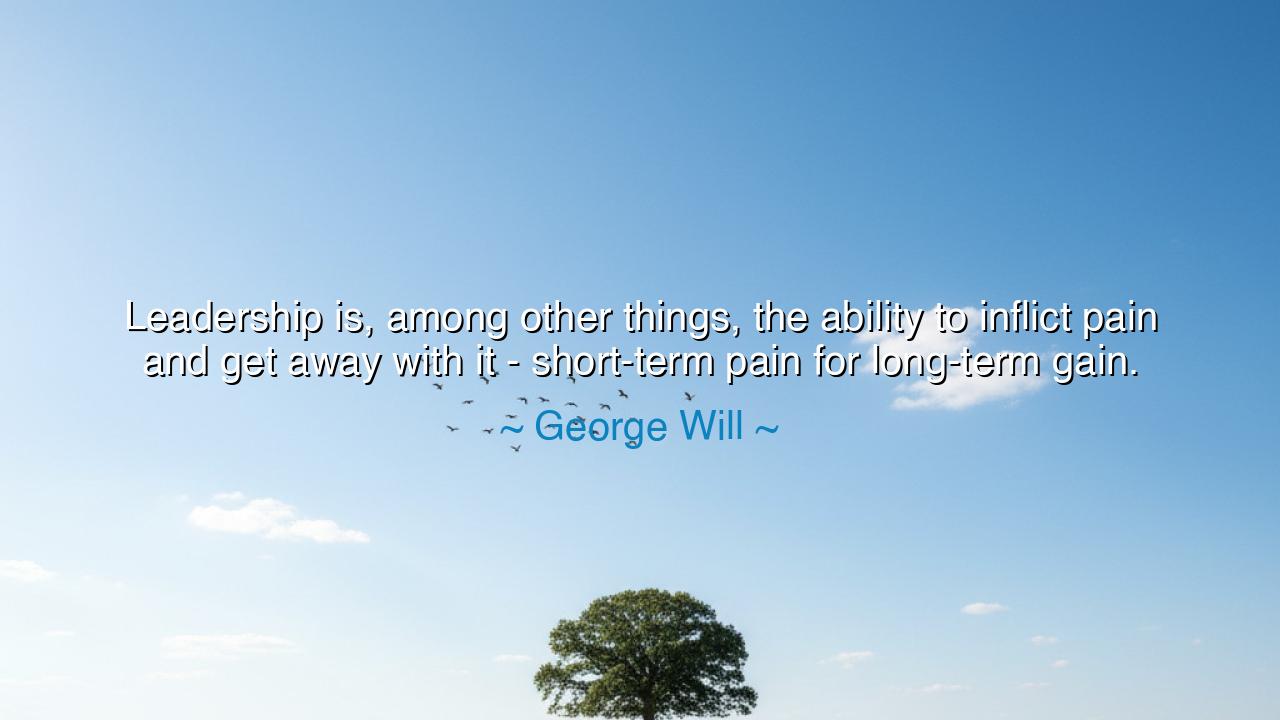
Leadership is, among other things, the ability to inflict pain
Leadership is, among other things, the ability to inflict pain and get away with it - short-term pain for long-term gain.






The words of George Will, sharp and unsparing, reveal a truth many shrink from naming: “Leadership is, among other things, the ability to inflict pain and get away with it—short-term pain for long-term gain.” Here lies the paradox of command. To lead is not to please at every turn, nor to preserve comfort above all things. Rather, it is to shoulder the burden of making decisions that wound in the present so that life may flourish in the future. Pain, when administered by the hand of wisdom and necessity, becomes not cruelty but medicine.
The origin of this thought comes from the crucible of politics and governance. George Will, long a commentator on the struggles of statesmen, observed how leaders must often enact policies that strain their people in the moment—higher taxes, stricter laws, even the horrors of war—yet without these sacrifices, greater ruin would follow. The art of leadership is not merely to command, but to endure the fury of the present for the salvation of the future. Few possess the courage to wield such authority, for the crowd hungers always for ease, but the leader must offer discipline.
History gives us vivid examples. Consider Winston Churchill, who, at the darkest hour of the Second World War, refused to flatter his people with promises of ease. Instead, he gave them only “blood, toil, tears, and sweat.” This was the infliction of pain—the stripping away of illusion, the call to suffering, the demand for sacrifice. Yet it was this very truth that steeled Britain’s resolve. The pain of endurance bore the fruit of ultimate victory. Churchill understood that short-term agony was the only path to long-term survival.
Or think of Abraham Lincoln, who during the Civil War inflicted the great wound of the Emancipation Proclamation. In issuing it, he tore at the social and economic fabric of the United States. It brought unrest, fierce opposition, and no small measure of chaos. Yet through that pain, the chains of millions were broken, and a new birth of freedom emerged. Here again we see the principle: the leader who dares to wound the present for the sake of the future is the one who writes his name upon history.
O children of tomorrow, understand this: a leader who fears to inflict pain will never achieve lasting good. Comfort is the enemy of growth. Just as the physician cuts into the flesh to remove disease, so must the ruler cut into the body of society to excise corruption, injustice, or weakness. The difference between tyranny and true leadership lies in the motive: the tyrant wounds for his own gain, but the just leader wounds for the healing of the people. Pain is a tool, not a goal; a passage, not a dwelling.
The lesson is luminous. If you are called to lead, do not measure your worth by applause alone. You will be cursed when you impose discipline, doubted when you demand sacrifice, and reviled when you strip away illusions. Yet if your cause is just and your vision clear, the fruits of your choices will vindicate you in the end. To lead is to endure unpopularity for the sake of truth, to stand firm while others falter, to hold the torch through the storm until dawn breaks.
Practical action lies before you: in your home, your work, or your community, do not shy away from difficult choices. If you must speak a hard truth, speak it. If you must deny an immediate comfort to preserve a greater good, do so with courage. Prepare yourself for anger and resistance, but also trust that true leadership requires such burdens. Let your motives be pure, your vision noble, and your hand steady. In this way, you will inflict pain not to destroy, but to strengthen, not to punish, but to prepare.
Thus let George Will’s words echo like the voice of the ancients: “Leadership is, among other things, the ability to inflict pain and get away with it—short-term pain for long-term gain.” Carry them with reverence, for they are not a license for cruelty, but a reminder of the weight of command. When your hour comes, choose the path of courage: bear the hatred of the moment, that you may deliver the blessing of the future.






AAdministratorAdministrator
Welcome, honored guests. Please leave a comment, we will respond soon